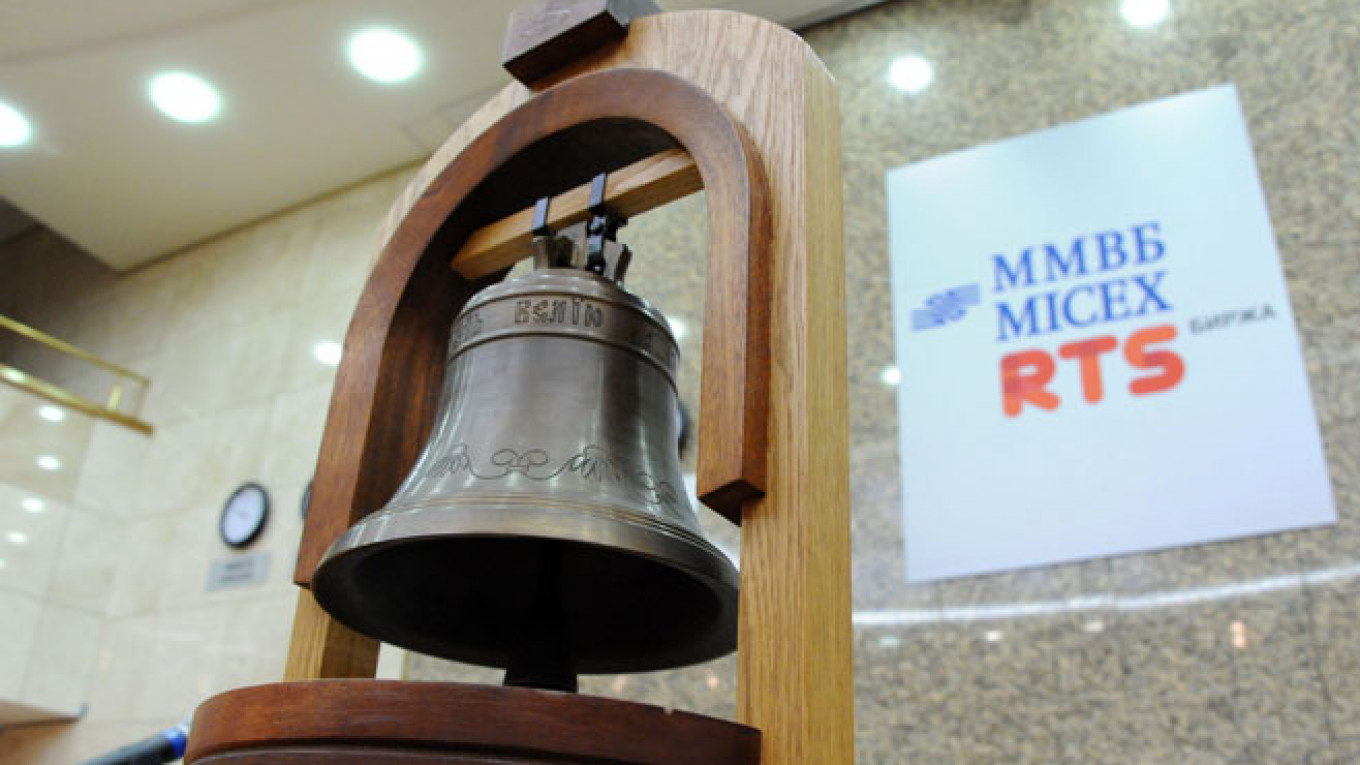As world leaders increase or trash their political clout depending on their audience and the statements they make about the situation in the Ukraine, some analysts were revising Russian GDP growth estimates to as low as 1.1 percent for the year.
Wednesday was a calmer day on the stock markets, following a dip of 10.8 percent Monday morning that vaporized near $60 billion of valuation from Russian companies. After falls of 1.7 percent on the ruble-denominated MICEX and 2.1 percent on the dollar-denominated RTS in early trading Wednesday, both indices rebounded to close with only minor losses. The MICEX was down 0.4 percent Wednesday evening, and the RTS had lost 0.2 percent.
The ruble strengthened slightly to 36 against the dollar and 49.4 against the euro Wednesday evening. This was well above the lows reached on Monday, but far from where the rates at the beginning of the year — the Central Bank's exchange rates on Dec. 31 were 32.7 rubles to the dollar and 45 to the euro.
Although Russia has seen some short-term budget benefits from ruble devaluation and increasing oil prices, the current impasse is not helping to fight stagnation or attract investment.
Direct investments slumped more than 7 percent in January and capital flight, according to Higher School of Economics estimates, reached $20 billion.
Actions taken by the Central Bank on Monday, which increased its key rate to 7 percent from the previous 5.5 percent, did nothing to reverse the trend. According to the bank's head Elvira Nabiullina, the measures were meant not to support the ruble but to fight inflation.
The goal is to bring inflation down to the 5 percent zone by the end of the year. It was 6.3 percent in January.
Tightening fiscal policy was topped by possibly impending U.S. sanctions, including economic ones, followed by President Vladimir Putin's claims that Russia may use force in Ukraine if necessary.
The heap of these latest events has caused some analysts to revise their overall economy forecasts.
"Our latest economic outlook [released at the end of February] did not take the Ukraine effect into consideration or the new Central Bank rates," said Yelena Fedotkova, an analyst at PSB Research, a Promsvyazbank subsidiary.
She said the efforts to keep inflation within 5 percent are unlikely to have the desired effect while economic growth will be even lower than expected.
"The factors mentioned, as well as the weakening ruble, will accelerate inflation, result in growing bank loan rates and overall will have a negative effect on the investment activity," Fedotkova said.
PSB Research said Wednesday it would decrease its initially modest GDP growth estimates for the year from the range of 1.5 to 1.8 percent to 1.1 to 1.3 percent.
Political standoff will also further stimulate the outflow of capital, Fedotkova said, as investors are reluctant to channel their money into the country that may be possibly involved in any kind of military activity.
Funds are currently going into short-term speculative operations on the stock exchange, said Stanislav Kleschyov, chief analyst at VTB24 investment department. But for conservative investors the current situation is unfavorable, he added.
"Growing uncertainty provokes investors to pull out their funds from the stock exchange and weak national currency gives reasons to find alternatives for the ruble as well," Kleschyov said.
As for businesses, a recent survey done by the Gaidar Institute suggests that more than a third of CEOs and owners of private companies would consider investing in production this year if the price for equipment went down and if the macroeconomic outlook were more certain, Vedomosti reported Monday. At the same time macroeconomic uncertainty was a headache for only 10 percent of surveyed state-controlled companies. No margin of error was given for the survey.
Contact the author at [email protected]
A Message from The Moscow Times:
Dear readers,
We are facing unprecedented challenges. Russia's Prosecutor General's Office has designated The Moscow Times as an "undesirable" organization, criminalizing our work and putting our staff at risk of prosecution. This follows our earlier unjust labeling as a "foreign agent."
These actions are direct attempts to silence independent journalism in Russia. The authorities claim our work "discredits the decisions of the Russian leadership." We see things differently: we strive to provide accurate, unbiased reporting on Russia.
We, the journalists of The Moscow Times, refuse to be silenced. But to continue our work, we need your help.
Your support, no matter how small, makes a world of difference. If you can, please support us monthly starting from just $2. It's quick to set up, and every contribution makes a significant impact.
By supporting The Moscow Times, you're defending open, independent journalism in the face of repression. Thank you for standing with us.
Remind me later.






